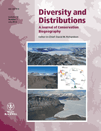
DIVERSITY AND DISTRIBUTIONS
metrics 2024
Illuminating the pathways of evolution and ecology.
Introduction
DIVERSITY AND DISTRIBUTIONS is a leading journal in the field of ecology, evolution, and systematics, published by WILEY. With an impressive impact factor and designated as Q1 in its category for 2023, this journal ranks 49th out of 721 in the Scopus database, placing it in the top 93rd percentile among its peers. The journal has been committed to advancing knowledge since its inception in 1998 and has embraced Open Access since 2019, ensuring that research is accessible to a broad audience globally. By publishing high-quality, peer-reviewed articles that explore biodiversity patterns, conservation strategies, and ecological dynamics, DIVERSITY AND DISTRIBUTIONS plays a crucial role in fostering discussions that help to understand and mitigate global ecological challenges. Located in the United Kingdom, this journal serves a diverse community of researchers, professionals, and students, making significant contributions to science and policy regarding biodiversity and its distributions.
Metrics 2024
 1.79
1.79 4.60
4.60 5.20
5.20 140
140Metrics History
Rank 2024
Scopus
IF (Web Of Science)
JCI (Web Of Science)
Quartile History
Similar Journals

GLOBAL ECOLOGY AND BIOGEOGRAPHY
Fostering Knowledge for Conservation and Global ChangeGLOBAL ECOLOGY AND BIOGEOGRAPHY is an esteemed academic journal published by Wiley that focuses on the dynamic interplay between ecological and biogeographical processes across the globe. With a strong commitment to advancing our understanding of biodiversity, conservation, and global change, this journal has secured a prestigious Q1 ranking in several categories, including Ecology, Ecology, Evolution, Behavior and Systematics, and Global and Planetary Change, highlighting its significant influence in the field. Since its inception in 1998, the journal has consistently provided a platform for high-quality research, featuring original articles that address critical ecological questions and emerging biogeographical trends. Researchers aiming to publish impactful work will appreciate the journal's rigorous peer-review process and its accessibility to a global audience. With a commendable track record reflected in its Scopus rankings, this journal is an essential resource for anyone dedicated to the study of ecology and biogeography.

AMPHIBIAN & REPTILE CONSERVATION
Advancing Conservation Through Cutting-Edge ResearchAMPHIBIAN & REPTILE CONSERVATION, published by the Amphibian Conservation Research Center & Lab, is a leading journal dedicated to the field of herpetology and environmental conservation. With an ISSN of 1083-446X and an E-ISSN of 1525-9153, this journal serves as a vital resource for researchers, conservationists, and students interested in the preservation of amphibian and reptile species. The journal has achieved remarkable rankings, categorized in the Q2 quartile for Animal Science and Zoology, Ecology, and Nature and Landscape Conservation as of 2023, reflecting its significant contribution to the scientific community. Over the converged years from 2016 to 2024, the journal has established itself as an integral platform for disseminating research findings, fostering collaboration, and enhancing the understanding of biodiversity and ecosystem dynamics. By embracing an open-access approach, AMPHIBIAN & REPTILE CONSERVATION ensures that critical research is readily available to a global audience, promoting informed conservation efforts and policy advocacy to safeguard these vital species amidst their declining populations.

OIKOS
Championing high-impact research in the heart of ecology.OIKOS is a leading journal dedicated to the field of Ecology, Evolution, Behavior, and Systematics, published by WILEY in the United Kingdom. Since its inception in 1973, OIKOS has established itself as a vital platform for researchers seeking to advance their understanding of ecological interactions and evolutionary processes, with its impact reflected in its prestigious Q1 classification in the 2023 Scopus rankings. The journal's dedication to high-quality research is exemplified by its robust ranking of #106 out of 721 in the relevant categories, situating it within the top 15% of journals globally. With a commitment to disseminating influential findings, OIKOS encourages the open exchange of ideas among a diverse range of scholars, making it an essential resource for academics, professionals, and students alike. Whether you are interested in innovative ecological theories or applied research with real-world implications, OIKOS provides a rich repository of knowledge to inform and inspire your work.
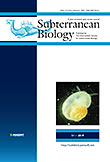
Subterranean Biology
Bridging the Gap Between Surface and Subsurface EcologySubterranean Biology is a premier open-access journal published by the International Society of Subterranean Biology, dedicated to advancing knowledge in the field of subterranean ecosystems. With an impact factor that reflects its significance in the academic community, this journal has achieved a commendable ranking of Q1 in Animal Science and Zoology and Q2 in multiple categories including Ecology, Evolution, Behavior and Systematics, Nature and Landscape Conservation, and Soil Science, based on its 2023 category quartiles. Located in Bulgaria and affiliated with the Department of Animal Biology at the University of Rome, the journal has been fostering open scientific discourse and accessibility since 2011. With its ISSN 1768-1448 and E-ISSN 1314-2615, it aims to provide a platform for researchers and students to explore the complexities of subterranean life forms and their ecological implications. By publishing a wide range of research articles, reviews, and case studies, Subterranean Biology empowers its readers to delve deeper into the hidden realms of our natural world.

FRAGMENTA ENTOMOLOGICA
Unraveling the complexities of insect science.FRAGMENTA ENTOMOLOGICA is a prominent peer-reviewed academic journal published by UNIV DEGLI STUDI DI ROMA LA SAPIENZA, focusing on various dimensions of entomology and insect science. With an ISSN of 0429-288X and an E-ISSN of 2284-4880, this journal has embraced an Open Access model since 2006, ensuring that valuable research is widely accessible to the global scientific community. Based in Italy, at the DIPARTIMENTO DI BIOLOGIA ANIMALE E DELL'UOMO in Rome, FRAGMENTA ENTOMOLOGICA is recognized for its commitment to high-quality research, ranking in the Q3 category across multiple categories, including Ecology and Insect Science, in 2023. Its Scopus rankings further underscore its relevance, showcasing its role in advancing knowledge in the fields of Ecology, Evolution, and Insect Behavior. This journal serves as an essential resource for researchers, professionals, and students interested in the intricate world of insects and their ecological roles, fostering academic discourse that bridges theoretical and practical entomological studies.
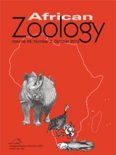
AFRICAN ZOOLOGY
Connecting Researchers with Nature's DiversityAFRICAN ZOOLOGY, published by Taylor & Francis Ltd, stands as a significant journal in the realm of Animal Science and Zoology, with a proud history dating back to 1996 and slated to continue until 2024. With an ISSN of 1562-7020 and E-ISSN 2224-073X, this journal provides a reputable platform for researchers and practitioners dedicated to the study of animal biology across the African continent. It has been recognized for its quality scholarship, evidenced by its Q3 categorization in the 2023 Scopus quartile rankings and an impressive rank of #182 out of 490 within its field. As an open-access journal, it facilitates the dissemination of vital research findings and promotes broader accessibility, catering to a diverse audience of professionals, scholars, and students alike. The journal aims to enhance our understanding of wildlife, conservation, and ecosystem dynamics in Africa, fostering collaborations that address critical ecological challenges. For researchers and enthusiasts keen on contributing to and staying informed about advancements in zoological science, AFRICAN ZOOLOGY is an essential resource that enriches the global discourse on biodiversity and conservation efforts.

Insect Conservation and Diversity
Advancing the Science of Insect ConservationInsect Conservation and Diversity is an esteemed academic journal dedicated to the field of insect science, published by WILEY in the United Kingdom. With its ISSN 1752-458X and E-ISSN 1752-4598, this journal serves as a vital resource for researchers and professionals striving to advance knowledge in biodiversity and conservation. The journal holds an impressive Q1 ranking in both Ecology, Evolution, Behavior and Systematics and Insect Science as of 2023, which reflects its rigorous peer-review process and significant contributions to the field. Recognized for its high-quality publications, Insect Conservation and Diversity ranks 9th out of 181 in insect science and 72nd out of 721 in ecology within Scopus, placing it in the top tiers of academic journals. Researchers are encouraged to submit their work from 2009 to 2024, enhancing our understanding of insect biodiversity and conservation strategies. Aimed at fostering advancements in knowledge and collaborative efforts, this journal is essential for all those committed to the study and preservation of insect diversity.

FOLIA GEOBOTANICA
Uncovering the past to illuminate the future of plant ecology.FOLIA GEOBOTANICA, published by Springer, is a distinguished journal dedicated to advancing the fields of Paleontology and Plant Science through the dissemination of high-quality research. With an ISSN of 1211-9520 and an E-ISSN of 1874-9348, this journal has been pivotal in providing a platform for innovative studies from 1994 to 2024. Notably, FOLIA GEOBOTANICA holds a Q3 ranking in Paleontology and a Q2 ranking in Plant Science as of 2023, affirming its relevance and contribution to the scholarly community. The journal is located in the Netherlands at VAN GODEWIJCKSTRAAT 30, 3311 GZ DORDRECHT, and is not an Open Access publication, ensuring comprehensive review processes and scholarly integrity. With Scopus rankings that place it in the 50th percentile for Plant Science and 46th for Paleontology, FOLIA GEOBOTANICA continues to attract researchers, professionals, and students who are keen to explore the intricacies of plant ecology and fossil records, thereby fostering a deeper understanding of ecological and evolutionary patterns.
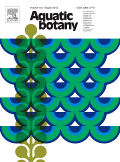
AQUATIC BOTANY
Nurturing the future of aquatic science.Aquatic Botany, published by Elsevier, stands as an influential scholarly journal in the fields of Aquatic Science and Plant Science. Established in 1975, this esteemed journal has maintained a strong commitment to advancing our understanding of aquatic plant life, providing a platform for high-quality research that contributes to both ecological awareness and the sustainable management of aquatic ecosystems. With its impact factor reflecting a commendable ranking in the Scopus database—#169 in Plant Science and #95 in Aquatic Science—it is recognized for its valuable contributions to the scientific community, evidenced by its Q2 quartile ranking in both categories as of 2023. The journal does not currently offer open access, ensuring rigorous review and scholarly integrity while being accessible through institutional subscriptions. Set against the backdrop of the Netherlands, Aquatic Botany continues to be a vital resource for researchers, professionals, and students looking to explore the complex interactions between aquatic flora and their environment, aiming to inspire innovative ideas and practical solutions for aquatic conservation and management.
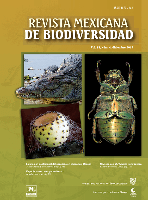
Revista Mexicana de Biodiversidad
Connecting Science and Conservation for a Thriving PlanetRevista Mexicana de Biodiversidad is a prominent academic journal dedicated to the field of biodiversity and conservation, published by the prestigious Instituto de Biología, Universidad Nacional Autónoma de México. Since its inception as an Open Access publication in 2005, it has aimed to disseminate high-quality research that advances the understanding of biological diversity in Mexico and beyond. With an ISSN of 1870-3453 and an E-ISSN of 2007-8706, the journal caters to a diverse audience, including researchers, professionals, and students, by providing vital insights into ecological studies, conservation strategies, and the sustainable management of natural resources. The journal is committed to fostering scientific collaboration and promoting the significance of biodiversity in addressing contemporary environmental challenges. By publishing innovative and impactful research, the Revista Mexicana de Biodiversidad plays an essential role in the global discourse on biodiversity conservation.